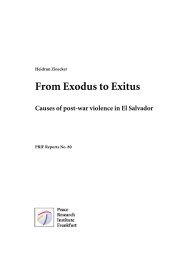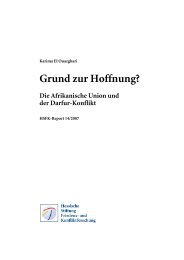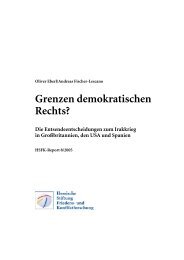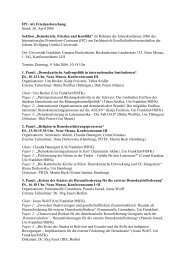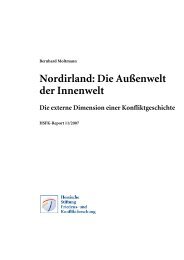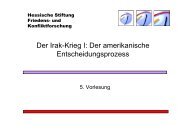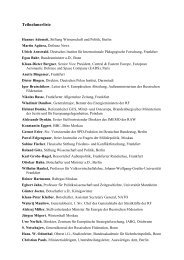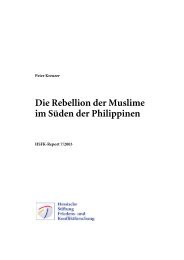The Normative Construction of the Military in Lithuania - HSFK
The Normative Construction of the Military in Lithuania - HSFK
The Normative Construction of the Military in Lithuania - HSFK
Create successful ePaper yourself
Turn your PDF publications into a flip-book with our unique Google optimized e-Paper software.
M<strong>in</strong>iotaite: <strong>Lithuania</strong>n Case I/14-2007<br />
fostered. <strong>The</strong> “mutual understand<strong>in</strong>g and trust between servicemen and <strong>the</strong> civilian<br />
population” should also be encouraged.<br />
A section <strong>of</strong> <strong>the</strong> document is devoted to issues <strong>of</strong> “democratic control over <strong>the</strong><br />
armed forces” (chapter 8) and is based on <strong>the</strong> relevant provisions <strong>in</strong> <strong>the</strong> Constitution. It is<br />
stressed that all decisions on defense policy and armed forces are to be made by <strong>the</strong><br />
democratically elected civilian government. <strong>The</strong> document underwrites <strong>the</strong> publicity <strong>of</strong><br />
decisions on defense policy and defense expenditure; it also establishes <strong>the</strong> ma<strong>in</strong><br />
pr<strong>in</strong>ciples and procedures <strong>of</strong> <strong>the</strong> civilian control <strong>of</strong> <strong>the</strong> armed forces. However, <strong>the</strong><br />
document “failed to establish a clear def<strong>in</strong>ition <strong>of</strong> <strong>the</strong> parliamentary overview and<br />
provided only limited tools <strong>of</strong> accountability and control” 23 .<br />
In general, one can say that <strong>The</strong> Basics <strong>of</strong> National Security universalized and<br />
legitimized <strong>the</strong> conception <strong>of</strong> political reality prevail<strong>in</strong>g <strong>in</strong> 1992-1995. At <strong>the</strong> time<br />
<strong>Lithuania</strong>’s membership <strong>in</strong> EU and NATO seemed to be a distant and hardly atta<strong>in</strong>able<br />
aspiration. No wonder, <strong>the</strong> document is ma<strong>in</strong>ly based on <strong>the</strong> assumption <strong>of</strong> self-reliant<br />
defense. Eventually, <strong>the</strong> assumption was suspended <strong>in</strong> <strong>the</strong> National Security Strategy and<br />
<strong>the</strong> <strong>Military</strong> Strategy that are more <strong>in</strong> tune with <strong>the</strong> spirit <strong>of</strong> <strong>the</strong> age.<br />
2.3. Law on Organization <strong>of</strong> <strong>the</strong> National Defense and <strong>the</strong> <strong>Military</strong> Service, 1998<br />
<strong>The</strong> evolv<strong>in</strong>g attitudes towards <strong>the</strong> foundations <strong>of</strong> national security and strategies<br />
<strong>of</strong> national defense were made more explicit <strong>in</strong> <strong>the</strong> Law on Organization <strong>of</strong> <strong>the</strong> National<br />
Defense and <strong>the</strong> <strong>Military</strong> Service (1998) and <strong>in</strong> <strong>The</strong> <strong>Military</strong> Defense Strategy (adopted <strong>in</strong><br />
2000, amended <strong>in</strong> 2004). <strong>The</strong> law <strong>of</strong> 1998 sets forth <strong>the</strong> fundamentals <strong>of</strong> organization,<br />
command and control <strong>of</strong> <strong>the</strong> national defense system, and establishes <strong>the</strong> procedures for<br />
<strong>the</strong> implementation <strong>of</strong> military and civilian service with<strong>in</strong> <strong>the</strong> national defense system.<br />
Accord<strong>in</strong>g to <strong>the</strong> law, <strong>the</strong> national defense system consists <strong>of</strong> 1) <strong>the</strong> M<strong>in</strong>istry <strong>of</strong> National<br />
Defense; 2) <strong>the</strong> Armed Forces and, <strong>in</strong> time <strong>of</strong> war, o<strong>the</strong>r armed forces: border police,<br />
special police units and citizens <strong>in</strong> organized resistance (guerilla) units subord<strong>in</strong>ate to <strong>the</strong><br />
Commander <strong>of</strong> <strong>the</strong> Armed Forces; 3) <strong>the</strong> <strong>Lithuania</strong>n <strong>Military</strong> Academy, <strong>the</strong> Non-<br />
Commissioned Officer (NCO) School and o<strong>the</strong>r military schools; 4) o<strong>the</strong>r state<br />
<strong>in</strong>stitutions established by <strong>the</strong> M<strong>in</strong>istry <strong>of</strong> Defense or subord<strong>in</strong>ate to <strong>the</strong> M<strong>in</strong>ister <strong>of</strong><br />
National Defense; 5) <strong>in</strong>frastructure assigned to National Defense and <strong>the</strong> enterprises<br />
established by <strong>the</strong> M<strong>in</strong>istry <strong>of</strong> National Defense.<br />
<strong>The</strong> law prescribes that “<strong>the</strong> pr<strong>in</strong>ciple <strong>of</strong> democratic civilian control shall be<br />
applied to all <strong>in</strong>stitutions with<strong>in</strong> <strong>the</strong> national defense system” (Art. 6). <strong>The</strong> law<br />
underwrites <strong>the</strong> requirement that Seimas determ<strong>in</strong>es <strong>the</strong> amount <strong>of</strong> funds to be allocated<br />
for <strong>the</strong> development <strong>of</strong> <strong>the</strong> Armed forces, <strong>the</strong> acquisition <strong>of</strong> weapons and o<strong>the</strong>r support<br />
equipment.<br />
23 Gricius A. and Paulauskas K. (2003) „Democratic Control over <strong>the</strong> Armed Forces <strong>in</strong> <strong>Lithuania</strong>“,<br />
<strong>Lithuania</strong>n Annual Strategic Review 2002. p.241.<br />
11



